IRGC General Alleges Foreign Conspiracy to Limit Iran’s Population Growth
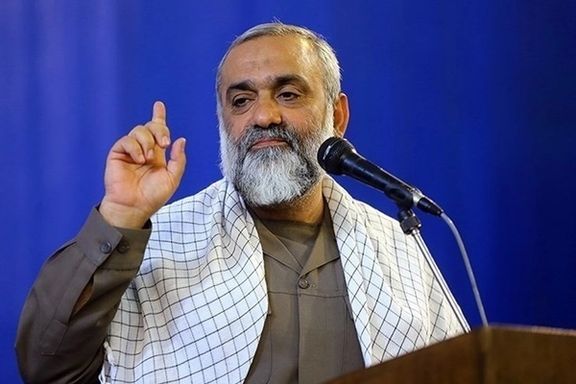
Mohammad Reza Naqdi, the Deputy Coordinator of the Revolutionary Guards, has claimed that foreign powers have orchestrated a plot to stunt population growth in Iran.

Mohammad Reza Naqdi, the Deputy Coordinator of the Revolutionary Guards, has claimed that foreign powers have orchestrated a plot to stunt population growth in Iran.
According to Naqdi, the strategy is motivated by fears of Iran's potential threat to superpower status of big powers.
"The enemy has planned to prevent the population increase in Iran due to the threat it poses to the superpowers," he stated.
In Iranian government's rhetoric, "enemy" usually refers to the United States.
He warned about the irreversible consequences of the country's declining birth rate, noting that if the trend persists, Iran is on track to become the world's third oldest country by 2041. He cautioned, "With the aging population, we are losing one of the elements of national security."
Naghdi added that 20% of Iranian couples are unable to conceive, primarily due to the rising age of marriage.
The fertility rate in Iran has dramatically dropped to a mere 0.6% from 1.23% in 2021, marking a steep downward trend from the 4.21% in 1984, shortly after the Islamic Revolution.
Iran's population has doubled since the early 1980s, growing from 40 million to 84 million. However, Supreme Leader Ali Khamenei has expressed concerns, urging that the nation's population should reach at least 150 million by 2050 to prevent an aged demographic profile.
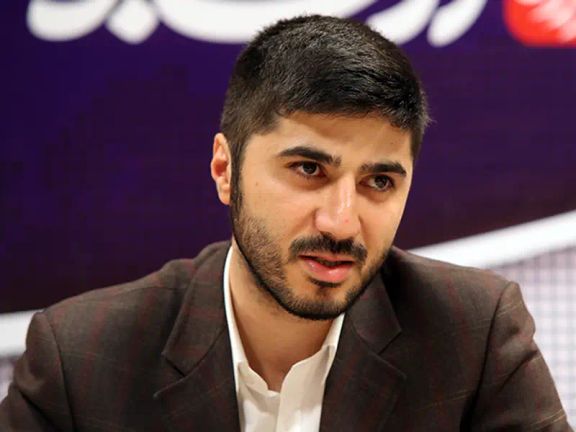
Bashir Biazar, a former managing director of the Islamic Republic of Iran Broadcasting (IRIB), has been detained in France and is awaiting deportation, according to Iran International's Paris correspondent.
Biazar, who was in charge of the state TV’s music office, is currently in administrative detention—a procedure utilized for urgent deportation cases under French law, Niloufar Pourebrahim reported late Friday.
Sources informed Iran International on Friday that the deportation process for Biazar is in progress following his detention. While Iranian officials assert that his arrest is linked to his anti-Israel activities, sources have disclosed to Iran International that he is facing multiple security-related charges.
The nature of these charges are not clear, although in the past similar cases Iranian diplomats and government employees abroad were found to have had links with Tehran's security and intelligence organs.
Iran’s Acting Minister of Foreign Affairs, Ali Bagheri-Kani, and the head of the Judiciary's Human Rights Headquarters, Kazem Gharibabadi, have called for Biazar’s immediate release. On Thursday, Bagheri-Kani instructed Iran's ambassador in Paris to urgently address Biazar’s case.
The Iranian Embassy in Paris has yet to respond to Iran International’s inquiries regarding Biazar’s detention.
Earlier, the state-affiliated Mehr News Agency described Biazar as an activist, noting that he was summoned by the French police and subsequently arrested without explanation.
This incident occurs amidst the ongoing imprisonment of several French citizens in Iran, including Cécile Kohler, Jacques Paris, and Louis Arnaud.
Biazar has resided in France since 2022 on a long-term family visa due to his wife’s residency. Prior to his arrest, he posted a video of his speech at the UN Human Rights Council last November, in which he criticized Israel and the sanctions imposed on Iran.
Previously living in London, Biazar identified himself as the secretary of the Iran-backed Islamic Student Association of London in interviews with Iran’s state-run outlets such as the IRGC's Tasnim News Agency.
In an interview with Tasnim, Biazar stated: "After obtaining a bachelor's degree in political science from Allameh Tabatabai University and a master's degree in international relations from a university in Hyderabad, India, I went to London. There, I began studying filmmaking at Kingston University, and after the 2009 elections, I joined the Islamic Society."
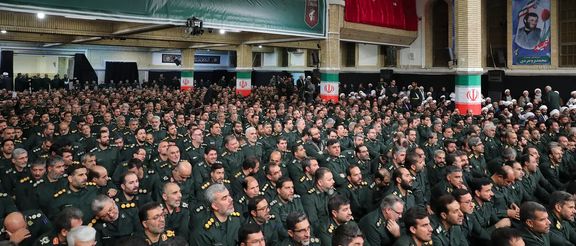
Helmut Brandstätter, a member of the Austrian parliament, has reiterated his commitment to exert "maximum pressure on the Iranian regime" and to support the democratic revolution movement within Iran.
Brandstätter's stance includes pushing for the designation of Iran's Islamic Revolutionary Guard Corps (IRGC) as a terrorist organization, a label he believes will impact Iran’s operational capabilities.
Last month, Brandstätter urged the European Union to implement sanctions against the IRGC, reflecting growing concerns within the EU about Iran’s role in global security threats.
The IRGC, known for its substantial role in quashing dissent through its regular forces and the Basij militia, has been instrumental in suppressing protests and public activities within Iran.
The United States officially designated the IRGC as a foreign terrorist organization in 2019, based on its involvement in terrorist operations globally. Following suit, the United Kingdom last year acknowledged Iran, with its active IRGC components, as one of the country's most significant foreign threats, having thwarted multiple IRGC-led plots on British soil, especially on Iran International journalists.
The potential classification of the IRGC as a terrorist entity by the EU could alter European-Iranian trade dynamics, given that the IRGC is estimated to control over 50% of Iran's economy.
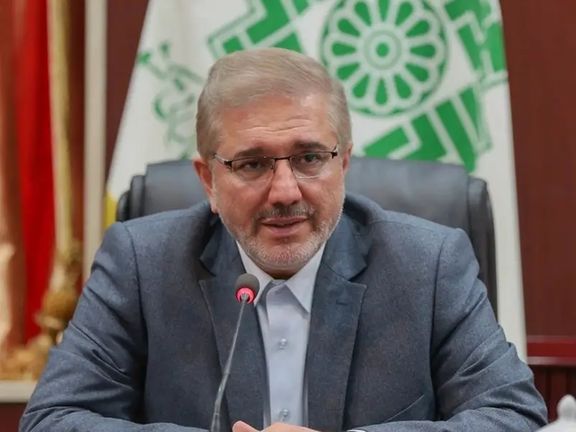
Davood Manzoor, head of the Planning and Budget Organization, announced his withdrawal from the June 28 presidential race in Iran, a week after registering to run.
The announcement was made through a social media post on X, where Manzoor cited the overwhelming presence of Revolutionary Front hardliner candidates and the presence of more suitable options as his reasons for stepping back.
The development comes in the wake of the death of President Ebrahim Raisi in a helicopter crash, which has led to the announcement of a snap election on June 28.
The practice of announcing candidacies only to withdraw later is seen as a move by many in Iran to garner visibility and influence in the political arena. It is anticipated that many of the 80 candidates who registered to run will also soon withdraw in hope of getting their share in the next administration.
While the Guardian Council, a 12-member body under the control of Supreme Leader Ali Khamenei, has initiated vetting the hopefuls to announce the final candidates, Ezzatollah Zarghami, the Minister of Cultural Heritage and Tourism, in an interview on Saturday, expressed hopes that the council will be more generous in approving a varied list of candidates than in previous years.
However, Hadi Tahhan Nazif, spokesperson for the council, denied any allegations of election engineering in an interview, claiming that the Council impartially assesses the qualifications of all candidates, irrespective of their political affiliations.
The council has disqualified hundreds of candidates in both parliamentary and presidential elections over recent years, particularly since 2020.
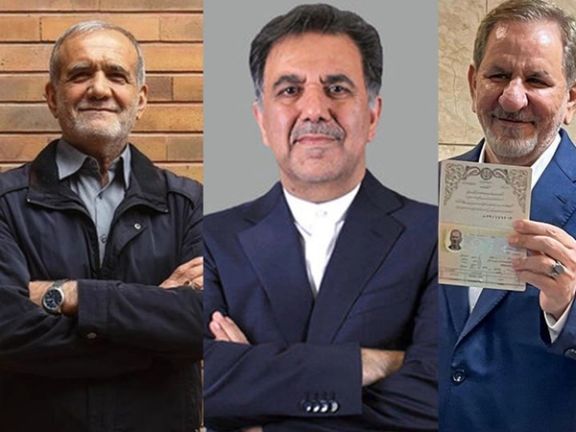
Iran's Reform Front, a coalition of 'reformist' groups and political parties, has put forward their candidates for the June 28 snap presidential election.
The announcement was made by Javad Emam, the spokesperson for the Reform Front, via a tweet that revealed Abbas Akhoundi, Masoud Pezeshkian, and Es'haq Jahangiri as the chosen candidates for the government-controlled election to choose a successor for Ebrahim Raisi who died in a helicopter crash last month. Each of these politicians who have registered to run secured two-thirds of the internal votes.
Former President Mohammad Khatami, who is highly regarded by many Iranian 'reformists', announced that he will endorse the presidential election only if at least one candidate from the Reform Front is permitted to run.
The path ahead for the nominees appears fraught with challenges. The Guardian Council, a 12-member body under the control of Supreme Leader Ali Khamenei, has a storied history of blocking 'reformist' candidates. The practice has reinforced the stronghold of conservative and hardline groups within Iran's political realm, with a significant number of potential 'reformist' candidates having been disqualified since 2020, affecting both parliamentary and presidential races.
Abbas Akhoundi, the former Minister of Roads and Urban Development under President Hassan Rouhani. Masoud Pezeshkian, with his past roles as health minister and parliamentary leader, earlier claimed to restore faith in the electoral process among the disenchanted public. Es'haq Jahangiri, a moderate political figure and former vice president is the other one named by the front.
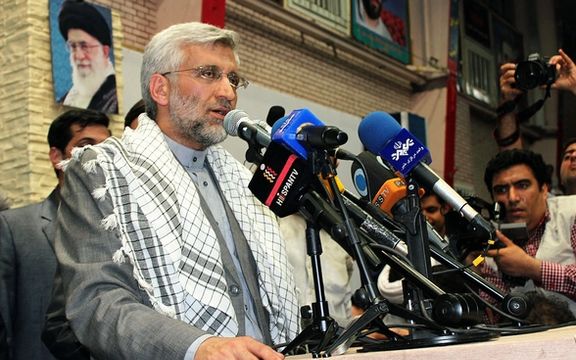
Amidst a crowded field of 80 candidates for the upcoming state-controlled presidential election in Iran, one name continually stands out: Saeed Jalili.
At 55, the anti-American ideologue and self-proclaimed revolutionary is seen by many as a potential replica of Ebrahim Raisi’s government.
The state-monitored Rouydad24 news outlet suggests that while his path to victory is complex, certain elements within Iran's political landscape could favor his potential to win the presidency.
Jalili, an ultraconservative close ally of Supreme Leader Ali Khamenei, belongs to the Principalist faction in Iranian politics, which emphasizes the principles of the 1979 Islamic Revolution.
Having run as a presidential candidate in the past, one of Jalili's official campaign slogans was “Great Jihad for Iran’s Leap Forward.”
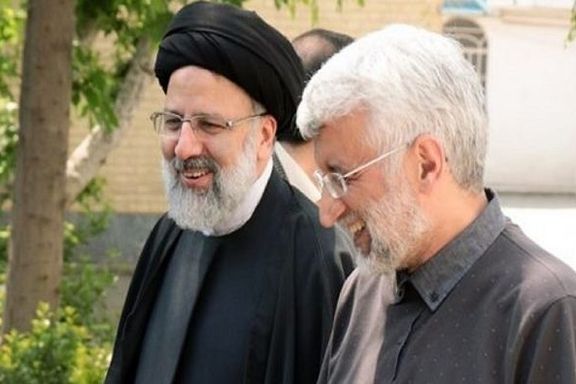
He has held significant diplomatic and security roles within the Iranian government, serving as the secretary of the Supreme National Security Council from 2007 to 2013 and currently as a member of the Expediency Discernment Council.
Khamenei, who many experts assert virtually selected Raisi in 2021 despite the facade of elections, has maintained a favorable relationship with Jalili for many years.
Pointing to his inflexibility as Iran’s nuclear negotiator between 2007 and 2013, Rouydad24 notes that Jalili’s resistance to making concessions and his rigid approach resulted in multiple UN Security Council and IAEA Board of Governors resolutions against Iran. These resulted in international economic sanctions that began to unravel the relative stability of Iran's oil-dependent economy.
During his tenure as deputy foreign minister, several European diplomats described Jalili to Reuters as someone who strongly and unwaveringly expressed his views. One diplomat even remarked that Jalili "specialized in monologue" rather than engaging in debate.
His approach often frustrated diplomats, with then-Under Secretary of State for Political Affairs William Burns recounting an instance where Jalili engaged in nearly 40 minutes of philosophical discourse during a meeting, avoiding direct answers and complicating the negotiation process.
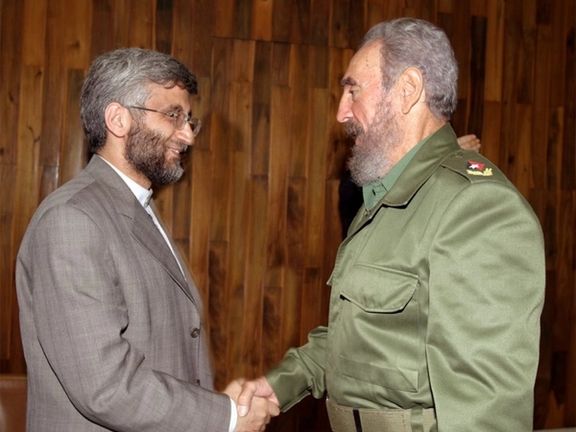
Yet, this firm stance on nuclear negotiations has shaped the perception of him as a figure who does not easily bend to Western pressures. It’s likely that certain factions, particularly hardline and conservative groups, may support him for his ideological purity and rigid approach to negotiations.
Rouydad24’s analysis of Jalili suggests that his resistance amid nuclear talks may have been part of a broader strategy by the regime to develop Iran's nuclear capabilities – while buying time.
Be that as it may, Jalili’s diplomatic style led some experts to conclude that he would not be a suitable candidate, if the regime wants to advance the state of its current foreign policy and improve relations with the West.
His main rival for the presidency may be Ali Larijani, a conservative and former parliamentary speaker. Some say the stage is set for a diplomatic dichotomy reminiscent of the 2013 election, where their contrasting approaches were already evident.
In 2022, according to some accounts, Jalili confronted Larijani over nuclear negotiations during a special meeting of the Expediency Council. Jalili reportedly proposed that Iran withdraw from the Non-Proliferation Treaty, a suggestion opposed by Larijani and others.
Rouydad24 analysis points out that in Iran's foreign policy, the true power lies with higher-level authorities who make the final decisions. This could be a reference to the Supreme Leader. The President and the Ministry of Foreign Affairs act as executors of these decisions. Despite this clear hierarchy, different administrations have managed to influence the decision-making process.
It’s unclear whether Jalili, a veteran of the Iran-Iraq war and former member of the Islamic Revolutionary Guards, would shift his stance on reaching a truce with Western powers.
Known for his strong “nationalistic” views and deep belief in the Islamic Republic’s moral and strategic success against perceived American aggression, Jalili has always taken a hardline approach. His track record suggests that as President, he would continue to emphasize resistance and minimal concessions, casting doubt on any potential move towards diplomatic compromise with the West.
It’s more likely that Khamenei will prefer to maintain the status quo, positioning Jalili as a convenient successor to Raisi.